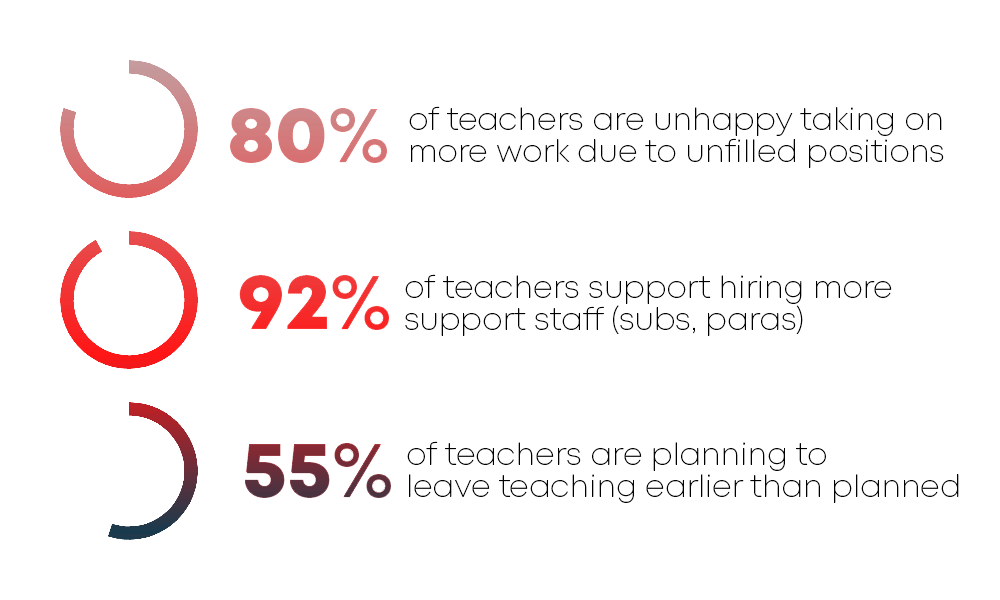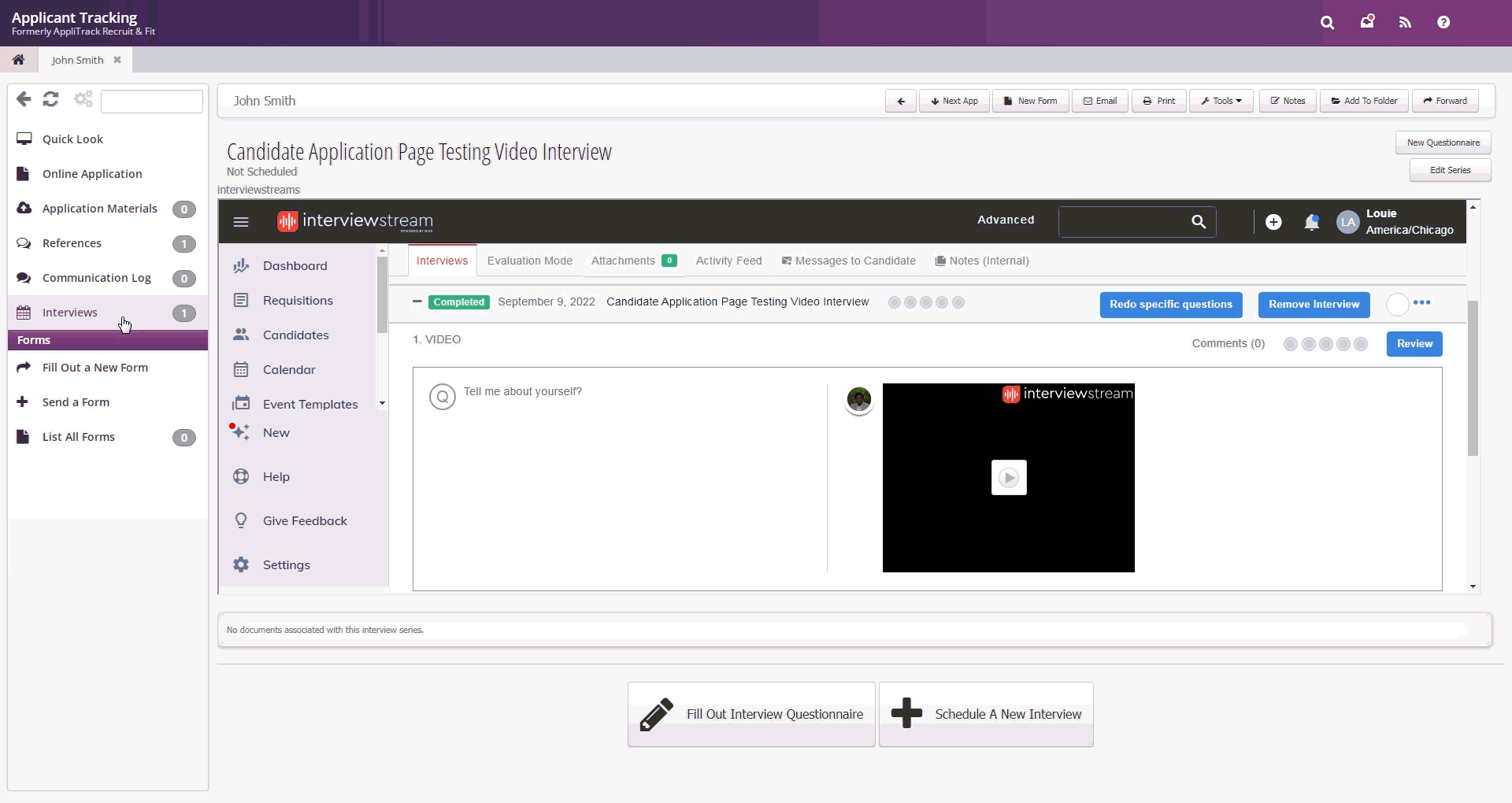Using Technology to Overcome the Teacher Shortage
interviewstream and Frontline Education recently partnered in a fireside chat webinar with K-12 HR professionals from Community Consolidated School District 93 and East Baton Rouge Parish School District to discuss strategies for using technology to overcome the teacher shortage. In case you missed it, here a few key takeaways from the webinar around how Frontline and interviewstream clients are using technology to innovate their hiring and retention methods.
School boards across the country have been hit hard by the challenge of hiring and retaining staff. In the current landscape:
- School districts in the USA are reporting 40% substitute fill rates.
- Teachers plan to retire or change careers in greater numbers than ever before.
- The number of unfilled teaching positions has surpassed 10,000 this year.
K-12 School districts are doing their best to encourage mentorship programs to hire and retain more educators, but hiring enough teachers remains a challenge for K-12 administrators.
School districts that are successful in recruitment and retention have made headway by innovating their practices using hiring, onboarding, and other school administration technology. Innovating through technology allows school districts to hire teachers faster, drive teacher growth, onboard new hires, and provide opportunities for end of the year feedback with pre recorded interviews.
Video interviews and remote hiring enable districts to screen their candidates 80% faster. And, with the time they save, they are able to reach out to 30% more candidates. In the face of teacher turnover and a country-wide deficit of teachers – districts are turning to hiring technology.
Trends and Challenges in K-12 Hiring
Across the United States, schools are reporting teacher shortages in special education, bilingual education, and STEM. In some areas (such as Community Consolidated School District 93) schools are able to fill ‘standard’ positions, says Julie Tobin (Director of Human Resources). But, for new or expanding programs, like bilingual and dual language programs, they need more qualified teachers.

(stats from weareteachers.com)
In other school systems, every subject and grade level operates with a deficit. In the East Baton Rouge Parish School District, the second largest school district in the state of Louisiana, they are experiencing shortages in almost every area.
Making sure administrators support teacher development helps keep retention rates high. Successful districts provide teachers with opportunities to develop into principals or administrators. A teacher that becomes a principal keeps knowledge within their school system, teachers that leave due to job stagnation do not.
Recruiting Teachers, Para Professionals, and Subs with Remote Interviewing Tech
With video interviews, every person is given a chance to present themselves as more than their resume. Those who have changed careers or had an employment gap have a chance to explain why they want to inspire students.
On the recruiter side, K-12 HR professionals are able to see at a glance their candidates’ ranking and where they are in the hiring process. It makes it easy to compare candidates against one another and review responses. Virtual interviews also serve to keep tabs on which candidates are dropping off, and where.

How Schools Are Using Hiring Tech In Their Teacher Recruitment Process
Community Consolidated School District 93 uses one way video interviews for their first round screening interviews. They ask five pre-recorded video interview questions and four written questions to all candidates. These questions focus on their core values and give them a comprehensive look at the candidate before calling them in for an in person or live video interview.
East Baton Rouge Parish Schools use video interviewing for their general screening needs, but they also extend the use of video interviews to their university partners. The universities prep upcoming teachers for what to expect when they join the job market.
Why Use Video Interviews For Internal Candidates?
Many school districts use digital interviews for external candidates, but not internal candidates. Schools are often already familiar with these candidates, but internal video interviews are equally useful when hiring teachers.
East Baton Rouge Parish Schools uses video interviews to choose assistant principals and principals. For Dana Morrison, it serves a double purpose. The future principal gains familiarity with a powerful hiring technology and K-12 recruiters can easily compare candidates.
For principal interviews, questions go beyond “Why are you passionate about K-12 administration?”. Candidates must answer the same scenario-based interview questions (allowing up to 10 minutes of response time). After all responses have been collected, recruiters compare and choose their favorite candidate.
Retaining Teachers with HR Technology
Virtual interviewing technology gives every external applicant a chance to impress recruiters, and they are just as useful for internal applicants. EBR uses internal on demand interviews to assist with their “grow their own” teacher programs. These one way video interviews help them make better decisions about where to place their internal candidates.
This is especially useful for development opportunities for para professionals and substitute teachers. Many qualified paras and subs want to have a classroom of their own one day. By sending them scenario based interview questions, principals and K-12 administrators gain a better understanding of who can handle the challenges of being a full time teacher.
How to Promote Teacher Growth & Company Culture
Showing company culture and core values through a website is tricky. And you want to be able to show your values to attract the right type of candidate. Adding a visual story to the recruitment process is one way districts have found to show their school’s company culture. To do this, districts include video clips from current teachers in their welcome message and district promotional materials.
At the end of the year, schools send out a request for a one way video interview from their teachers. School districts might ask questions like:
- What feedback would you give us?
- What improvements can be made in this district/school?
- How could the school board help elevate your ability to teach students?
- Do you need any development to continue to excel at your job?
- What do you like about working in this district?
From these interviews, HR administrators can piece together the story and culture of their school to show prospective teachers, pinpoint weak areas for growth, and effectively communicate who they are to prospective candidates.
Fill Teacher And Substitute Teacher Positions With interviewstream
If you’re looking for a better way to conduct internal and external interviews and develop your teachers, we would love to help. As schools struggle to hire teachers, video interviewing and remote hiring are becoming more popular – start hiring faster now with interviewstream.
About The Author
Caroline Chessia is the Marketing Operations Specialist at interviewstream. She loves color-coordinated graphs, hiking in the mountains, and every dog she meets—especially the Golden Retrievers.
